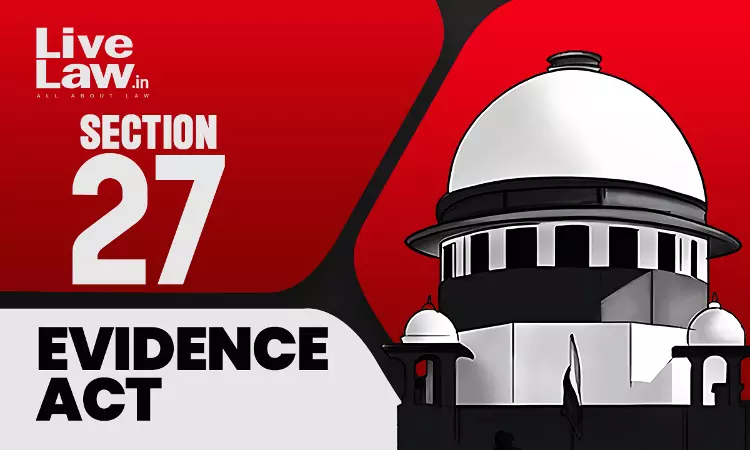S. 27 Evidence Act | Only Disclosure Leading To Recovery Of Weapon Admissible; Statement About Its Use Not Admissible : Supreme Court
Yash Mittal
8 Oct 2025 10:16 AM IST

Section 27 Evidence Act
The Supreme Court on Tuesday (October 7) acquitted three individuals for the offence of murder (Section 302 IPC) after noting that the prosecution had relied on their disclosure statements under Section 27 of the Evidence Act (“Act”), where they confessed that the weapon recovered was the weapon of crime.
A bench of Justice Pankaj Mithal and Justice Prasanna B. Varale held that only that part of the disclosure statements under Section 27 would be admissible which supports the recovery of an object, and not that part which supports the maker's statement about the use of the object in the crime, as it would amount to a confession being inadmissible under the Act.
“We are afraid that the submission of the State counsel, that as the appellants themselves stated that they took the police to the place where they hid the weapons, by which they committed the offence indicates that the appellants admitted to have committed the offence with the above weapons, cannot be accepted. The statement of the appellants that the weapons recovered were the weapons of crime cannot be read against them in view of Sections 25 and 26 read with Section 27 of the Indian Evidence Act, 1872. Only that part of the statement which leads the police to the recovery of the weapons is admissible, and not the part which alleges that the weapons recovered were actually the weapons of crime.”, the court said.
The judgment authored by Justice Mithal clarified that “not all information disclosed by a person in police custody is required to be proved as against the accused person; only that part which distinctly relates to the discovery of a fact is admissible and can be proved.”
The Court cited the Privy Council's landmark ruling in Pulukuri Kottaya v. King Emperor, 1947 and its recent affirmation in Manjunath v. State of Karnataka, 2023 to hold that the prosecution could not use the appellants' alleged statement that they "committed the offence with the above weapons" as proof of guilt.
“In other words, the information leading to the recovery of the weapons of crime is admissible, but not the information that the crime was actually committed by the said weapons.”, the court said.
Weapon Not Forensically Linked To Crime
The recovered weapons were never forensically linked to the crime. No FSL report was produced to prove that the blood on the weapons matched the blood of the deceased. Without this, the recovery only proved possession of weapons, not their use in this specific crime, the Court said.
“The weapons were no doubt recovered allegedly on the pointing out of the appellants. However, no effort was made to match the blood on the said weapons with that of the deceased. The weapons were sent for forensic examination but no report of the forensic laboratory was produced to establish that the weapons so recovered were smeared with the blood of the deceased to prove that they were actually used in the murder of the deceased.”, the court said.
“Thus, in the aforesaid facts and circumstances of the case, we are of the view that High Court manifestly erred in interfering with the findings of acquittal recorded by the Trial Court and reversing the judgment so as to convict the appellants. It is doubtful whether the offence has been committed by the appellants. The conviction of the appellants is accordingly set aside. The appeals are allowed, and the appellants are acquitted of the alleged offence by granting them the benefit of doubt.”, the court held.
Cause Title: RAJENDRA SINGH AND ORS. VERSUS STATE OF UTTARANCHAL ETC.
Citation : 2025 LiveLaw (SC) 980
Click here to read/download the judgment
Appearance:
For Appellant(s) Mr. Vivek Singh, AOR Ms. Mary Mitzy, Adv. Ms. Ms. Saumya Saraswat, Adv. Mr. Ayush Gupta, Adv. Mr. Abhishek Gupta, Adv. Mr. Vishwajeet Singh Bhati, Adv.
For Respondent(s) Mr. Kuldeep Parihar, D.A.G. Mr. Akshat Kumar, AOR Ms. Anubha Dhulia, Adv. Ms. Ikshita Parihar, Adv. Mr. Amit Pawan, AOR


